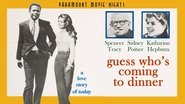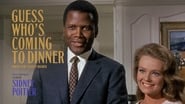jimwest08607
How do they do it? Here is the list of ingredients - A) a Magical Black Superman who is loaded with super powers - handsome, a doctor, a Nobel Prize nominee (!!!), so noble that he refused sex before marriage, and he wouldn't even marry the girl without her parents' consent (This writer is completely heterosexual, but if I met a guy like that, I'd marry that dude myself). B)The girl's parents were played by American Cinema's First Couple, Film Integrity Personified, whose very presence led credence to the premise of the film. C) The bulk of the angry dissent is assigned to the poor, working class, and easily dismissible "colored" father, who has been left to the past by his Magical Black Son. In a scene completely devoid of reality, the Son castigates his father in brilliant cinematic fashion (an act which would have gotten him immediately popped in the mouth in any real Black family of that era, even at that age. Kramer,obviously, never spent a moment in a Black home in his life. That level of disrespect for parents was unheard of in Black families at that time. If the quiet, docile mother had walked in during that dramatic tirade, she would have slapped her Son, herself - "Boy, have you lost your mind???....". ) D) The rest of the angry dissent was saved for Kramer's most tone deaf moment in the film, when the White family's self-sacrificing "good colored girl" maid, in full throttle, Hattie McDaniel-inspired form, throws herself in front of her virtuous White charge, and savagely attacks the Magical Black Man for having the audacity to forget his place. Kramer really played to the heart of his target audience with this scene, allowing them to vent, through privileged laughter, at a stereotype that they had lived with so comfortably for generations. Kramer, with this scene, was blissfully dismissive of the sensitivities of the Civil Rights era Black audiences who helped to make this movie a hit. This scene was played for laughs and it is often fondly recalled by fans of the film. Rest assured, however, the gales of laughter this scene caused in Manhattan's Upper East Side was matched, pound for pound, with groans of anger (and worse) in Harlem. Yes, GUESS WHO'S COMING TO DINNER was made for easy digestion by a generation of infants with weak and sensitive stomachs. The question of course now is, 51 years later, has that generation truly grown up?
Fletcher Conner
Even after 50 years, there are still many takeaways from Guess Who's Coming to Dinner that stand out. The daughter of a wealthy white family bringing home her African-American fiancée is certainly more widely accepted today than it was in the 60s, but the cultural opinions on the subject aren't vastly different between 1967 San Francisco and the some parts of the South today. The reactions of her family are very telling, they are shocked, but the only person truly offended is Tillie, their African-American maid. Her prejudices are more intense towards her own race, then the views of any of the white characters. Everyone's real desire is to maintain the status quo, and it takes a lot to get them to move past that and embrace a relationship that upends that.The entire cast excels, particularly Spencer Tracy as the father trying to do what's best for his daughter and Katharine Hepburn as the supportive mother. Beah Richards also is very strong as Mrs. Prentice, another mother seeing the love between them are realizing it is stronger than any of the difficulties they will assuredly face.
Hitchcoc
Let's not settle our 2016 values on this film. Interracial marriage is so commonplace these days. Not that it is accepted very well in many places. This film is one of the first to address the issue and it is not tame. When the young people go to the home of the white folks, there is a moment when a nuclear explosion may hit. Spencer Tracy always had a slow burn and he utilizes it well here. Still, it is too much for him at the beginning. One has to wonder if even the more liberal viewers of marriage knew that this was a road to a difficult life. Even today, it's a hard road to travel at times. One thing I appreciated was that we got the perspective from both sides, especially Sidney's father. Racial issues aren't always a one way street. This film needs to be seen even if one might think it dated.
sharky_55
"They call me Mister Tibbs!" thunders Sidney Poitier in In the Heat of the Night, a classic, monumental line from a film that would later win Best Picture amongst other accolades. The cynicism in some may attribute this recognition as a sort of over-compensation and apology. In this film itself Poitier even references the phenomenon, remarking how he (jokingly) thinks he has advanced his career so quickly at such at young age because no one in his way wanted to seem prejudiced. It is easy to fall victim to this mindset of Poitier's various roles in the 50s and 60s as the black saviour, the Negro that steps into the white man's position flawlessly and rights their wrongs. He is no different here; Kramer has gone to great lengths in giving not an inch of breathing room or hesitation at our judgement of Dr. Prentice. The Yale educated doctor is polite, well-spoken, courteous, sensitive and worldly. He has stepped into the best possible outcome of his modest upbringing and is striving to do even more good for those without the opportunity to succeed like he has. Never are we allowed to have any doubt that this would be a man you would be proud to have marry your daughter. Some may see this as an easy cop-out, to make Prentice so unequivocally perfect that we cannot object to his character other than to point to the colour of his skin. Looking back on this move it seems a flaw, and yet a necessary step in order to bypass other distractions and get to the core of the issue itself. Prentice has fallen in love, in a mere 20 minutes, with the much younger Joey Drayton. It seems to be an intentional drawing of her character to create the perception of a naive and vulnerable young woman, almost child-like, against the much older Prentice to give the impression of a mismatch, of the black man preying on the innocence of the white girl. Kramer's film is full of these points that are supposed to subconsciously allow the audience to address and re- consider their own biases. We are positioned like the 'phony' liberal Drayton couple, who have been adamantly outspoken against racial discrimination, but hesitate when it is a matter concerning their own daughter. Would we make the same decision? Of course this does seems dated to the modern viewer. But just consider that these overt racist actions and behaviours have merely taken a step back and become deep-seated concerns rather than being blasted out of our mouths. The Drayton's think along that old line: "I've got nothing against Negroes, but would you want your daughter to marry one?" In this day and age it has merely morphed and taken on a more subtle approach, by beginning a sentence with: "I'm not racist, but..."Spencer Tracy and Katharine Hepburn are of course the stand-outs. We have all heard of the health issues that plagued Tracy right through the shooting of the film, so much so that it becomes apparent that when he monologues about a youthful love long, long gone from his past Hepburn's misty eyes are not a hundred percent acting (we now know of their secret love affair that spanned twenty six years). They both have key scenes where we are forced to confront that perhaps their fashionable liberalism is not so easily applied to close, more sensitive topics. Hepburn is lik a crying stone at first, stony- faced and silently furious at the sight of her daughter's choice. Later, in a sweeping damnation that would have even the hardest-hearted cynic cheer out, she fires a racist employee for daring to question Joey's decision. Tracy's pleasant nature turns confrontational as he realises what is going on, and we can see the inner wrestle with his values. Later, in what seems like a contrived accident, he hits a negro's car and the resulting scuffle and argument unearths some deeply buried hostilities. What Kramer has show us here is how momentary bursts of anger and passion can make even our most concealed biases surface and rear their ugly head. Spike Lee would later perfect this realisation. Of course there are flaws. The time limit that is forced upon the parents is arbitrary and contrived, each day more and more resembling a dramatic device. Poitier's saviour role did not exactly sit well with many of his fellow black citizens, but as a sell-out. It is perhaps a bit too much to ask of the audience to believe in this perfect negro here to revolutionise and cleanse our racial biases, even if it was a necessary move for its time. Prentice Senior remarks that even with the law on their side they would face strong opposition from both races. The black maid's role is seldom more than to add sass and dismissive one-liners here and now again, as if to reinforce the disapproval of the black community too. But Kramer is correct; the law does not always mean a quick and easy turning of public moral opinion. We see this even today.








